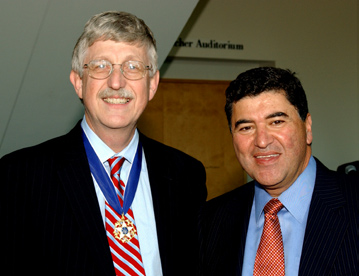| |
 |
|
|
|
|
| |
Dr. Francis Collins (l) shows his new medal, joined by NIH director Dr. Elias Zerhouni. |
|
President George W. Bush awarded the Presidential Medal of Freedom, the nation’s highest civilian award, to NHGRI director Dr. Francis Collins for revolutionizing
genetic research. The ceremony took place in the East Room of the White House on Nov. 5.
“Under his leadership, the Human Genome Project mapped and sequenced the full human genome and greatly expanded our understanding of human DNA,” said Bush.
Collins was one of eight recipients
of the award, which this year included Harper Lee, author of To Kill a Mockingbird and civil rights pioneer Benjamin Hooks.
Bush described Collins as “the man who led the federal [human genome] project to full and thrilling success. Many discoveries yet to be made, and many scientific triumphs yet to be achieved, will be directly traceable
to the work of the human genome project.”
He also called Collins “a well-rounded man. Though he routinely works a 90-hour week, he is an accomplished singer and guitarist. I know this because I once heard him at the National Prayer Breakfast. You see, when a man can get up and sing in front of 3,000 people at 8 in the morning, there’s something
special in his DNA.”
NIH director Dr. Elias Zerhouni said, “The completion of the Human Genome Project will remain a landmark of scientific achievement for centuries
to come. The multi-faceted leadership of Francis Collins was the essential ingredient for the success of this international endeavor that has brought honor to our country and to the NIH. I cannot think of a better way to recognize his extraordinary scientific talent and selfless dedication to public
service than for President Bush to bestow the Presidential Medal of Freedom
on Francis Collins.”
The medal, established in 1963, may be awarded by the President “to any person
who has made an especially meritorious contribution to the security or national interests of the United States, or world peace, or cultural or other significant public or private endeavors.” 